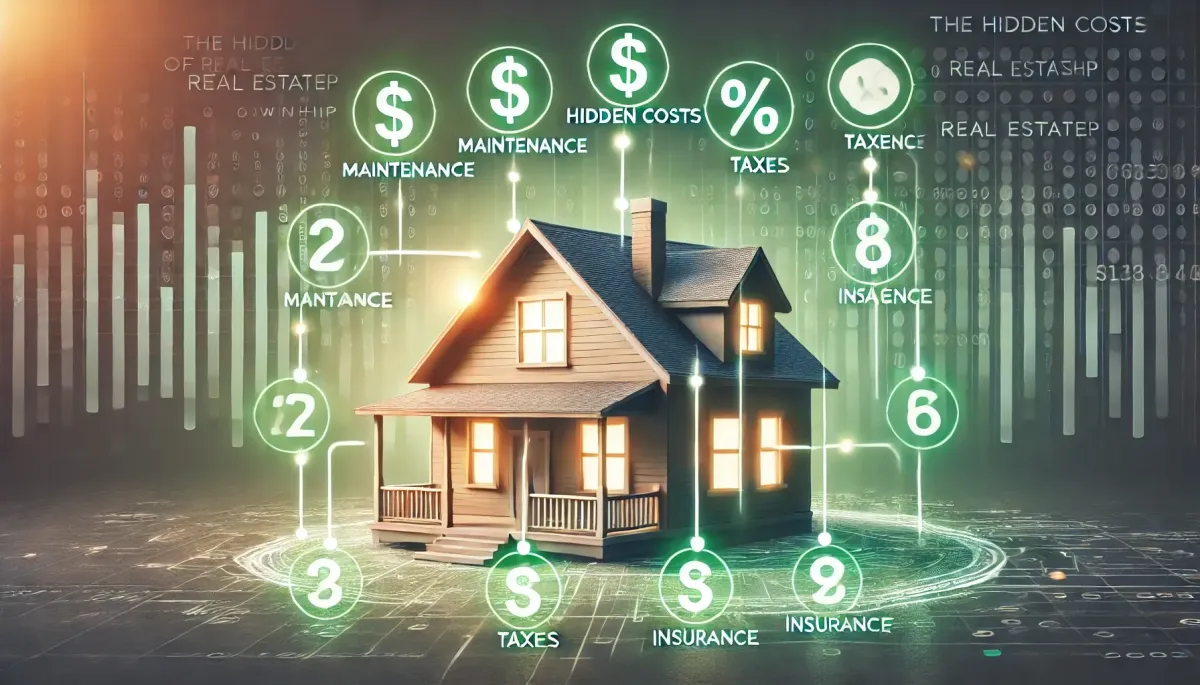
The Hidden Costs of Real Estate Ownership (and How to Avoid Them)
The Hidden Costs of Real Estate Ownership (and How to Avoid Them)
Owning real estate is a dream for many—a symbol of stability, wealth, and long-term investment potential. While the benefits of property ownership are well-known, the hidden costs often take owners by surprise. These expenses can erode returns and turn a seemingly lucrative investment into a financial strain.
Understanding these hidden costs and how to mitigate them is essential for any savvy investor. In this article, we’ll uncover the true costs of real estate ownership and share strategies to help you avoid or minimize them.
1. Maintenance and Repairs
One of the most overlooked costs of property ownership is the ongoing expense of maintaining and repairing the property.
Common Costs:
Regular maintenance (lawn care, cleaning, painting)
Repairs (plumbing, electrical issues, roof leaks)
Unexpected emergencies (flooding, broken appliances)
How to Avoid It:
Set aside 1%–3% of the property’s value annually for maintenance.
Conduct regular inspections to identify and address issues early.
Consider properties with newer construction or materials that require minimal upkeep.
2. Property Taxes
Property taxes are a recurring expense that varies widely depending on location and property value. Rising property values can also lead to increased tax bills over time.
How to Avoid It:
Research property tax rates in the area before buying.
Factor potential tax increases into your long-term budget.
Look for properties in areas with favorable tax policies or exemptions.
3. Insurance Premiums
Homeowners insurance is a non-negotiable cost for property owners, and in some areas, additional coverage like flood or earthquake insurance may also be required. Premiums can increase based on the property’s location, size, and risk factors.
How to Avoid It:
Shop around for the best insurance rates.
Bundle insurance policies to save on premiums.
Choose properties in low-risk areas to minimize additional coverage requirements.
4. Financing and Mortgage Fees
Beyond the interest payments, owning a property often involves several financing-related costs:
Mortgage origination fees
Appraisal and inspection costs
Closing costs
Over the life of the loan, even small percentage points can add up to significant amounts.
How to Avoid It:
Negotiate lower fees with your lender.
Make a larger down payment to reduce monthly costs and interest.
Consider refinancing options to secure better rates when possible.
5. Vacancy Costs
For rental property owners, vacancy periods can significantly impact profitability. When a property is unoccupied, there’s no rental income to offset the ongoing expenses like mortgage payments and utilities.
How to Avoid It:
Research rental demand in the area before purchasing.
Market your property effectively to minimize vacancy periods.
Set aside savings to cover expenses during vacancies.
6. HOA Fees and Special Assessments
If your property is part of a homeowner’s association (HOA), you’ll need to pay monthly or annual fees. Additionally, HOAs can levy special assessments for unexpected expenses like community repairs or upgrades.
How to Avoid It:
Review HOA bylaws and budgets before purchasing.
Factor in HOA fees when calculating affordability.
Avoid properties with unstable or poorly managed HOAs.
7. Depreciation and Obsolescence
While properties typically appreciate in value over time, depreciation of the building itself and obsolescence of features (like outdated kitchens or HVAC systems) can reduce a property’s value or rental potential.
How to Avoid It:
Invest in regular updates and renovations to keep the property competitive.
Consider newer properties that require less immediate upgrading.
Focus on high-demand locations to counterbalance potential depreciation.
8. Legal and Regulatory Costs
Real estate ownership comes with its share of legal and regulatory requirements, which can lead to hidden costs:
Permits for renovations
Compliance with local laws
Legal fees for tenant disputes or zoning issues
How to Avoid It:
Stay informed about local regulations and compliance requirements.
Work with reliable contractors and legal professionals.
Choose properties in areas with clear and stable regulations.
How Fractional Ownership Can Help Avoid These Costs
For those looking to reap the benefits of real estate without the burden of hidden costs, fractional ownership offers an appealing alternative. Platforms like EstateX enable you to invest in real estate with minimal upfront commitment and shared expenses.
Key Benefits of Fractional Ownership:
Lower Financial Burden: Maintenance, taxes, and insurance costs are shared among multiple owners.
No Management Hassles: Professional property managers handle upkeep and tenant relationships.
Flexibility: Start investing with as little as $100, and avoid the need for mortgages or large down payments.
By participating in fractional ownership, you can enjoy the advantages of real estate investment while avoiding many of the challenges associated with traditional property ownership.
Conclusion
Real estate ownership comes with many hidden costs that can erode profitability if left unchecked. However, with proper planning, research, and innovative investment models like fractional ownership, you can maximize the benefits of real estate while minimizing the risks.
Whether you’re a first-time buyer or an experienced investor, staying informed about these costs is essential to making smarter financial decisions.
Ready to explore cost-effective ways to invest in real estate? Visit EstateX to learn more about fractional ownership and start building your portfolio today.
Income Disclaimer
The information provided in this blog is for informational purposes only and should not be considered as financial, investment, or legal advice. Real estate investments, including fractional ownership, carry inherent risks, and there is no guarantee of earning specific income or returns.
Past performance is not indicative of future results. Market conditions, property values, and other factors can fluctuate, potentially affecting investment outcomes. Rental income, property appreciation, and other financial benefits are subject to market conditions and are not guaranteed.
Before making any investment decisions, it is strongly recommended that you conduct thorough research, assess your financial situation, and consult with a licensed financial advisor or other qualified professionals. By engaging in any investment opportunity, you acknowledge and accept the risks involved and assume full responsibility for your financial decisions.
